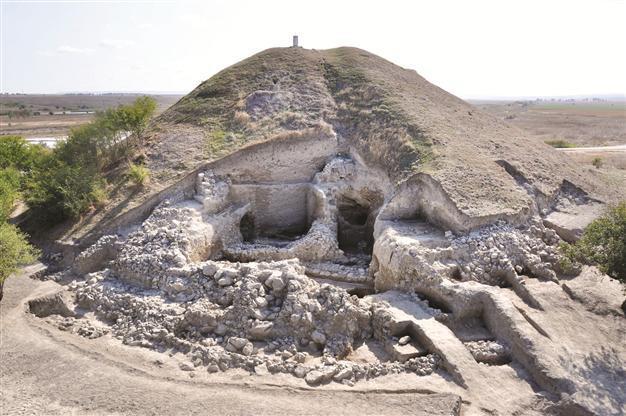Oldest ancient town revealed in Bulgaria
SOFIA - Agence France-Presse

Bulgarian archeologists have uncovered the remains of the oldest prehistoric city in Europe, founded around a salt mine in the country’s east. AFP photo
Archaeologists in eastern Bulgaria say they have unearthed the oldest prehistoric town ever found in Europe, along with an ancient salt production site that gives a strong clue about why massive riches were discovered in the region.
Excavations at the site near the modern-day town of Provadia have so far uncovered the remains of a settlement of two-storey houses, a series of pits used for rituals as well as parts of a gate, bastion structures and three later fortification walls, all carbon dated between the middle and late Chalcolithic age from 4,700 to 4,200 BC.
‘Extremeley interesting’“We are not talking about a town like the Greek city-states, ancient Rome or medieval settlements, but about what archaeologists agree constituted a town in the fifth millennium BC,” said Vasil Nikolov, a researcher with Bulgaria’s National Institute of Archeology, after announcing the findings earlier this month.
Nikolov and his team have worked since 2005 to excavate the Provadia-Solnitsata settlement, located near the Black Sea resort of Varna.
A small necropolis, or burial ground, was also found this year, but has yet to be studied more extensively and could keep archaeologists busy for generations. Archeologist Krum Bachvarov from the National Institute of Archeology qualified this latest find as “extremely interesting” due to the peculiar burial positions and objects found in the graves.
“The huge walls around the settlement, which were built very tall and with stone blocks are also something unseen in excavations of prehistoric sites in southeast Europe so far,” Bachvarov added.
The area is home to huge rock-salt deposits, some of the largest in southeast Europe and the only ones to be exploited as early as the sixth millennium BC.
“This is the first time in southeast Europe and western Anatolia that archeologists have come upon traces of salt production at such an early age,” he added.
